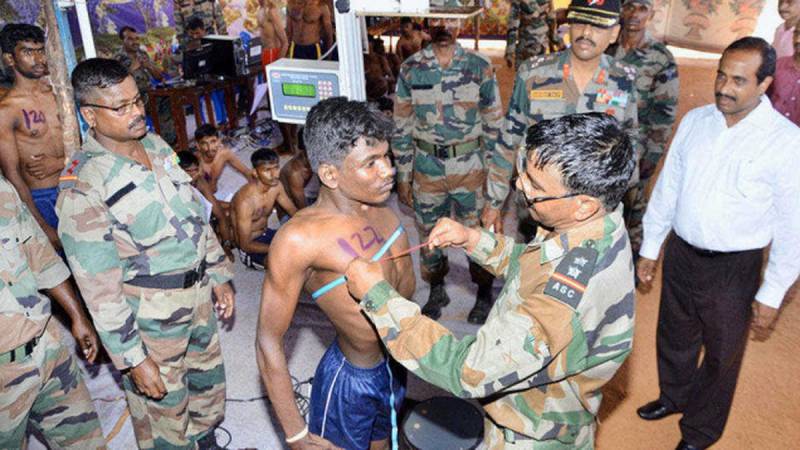Dreaming of joining the Indian Army? One of the key hurdles you’ll face is the vision test. But don’t worry – with the right preparation, you can clear it with ease! From understanding the Army’s vision standards to simple exercises and tips, this blog will help you get your eyes in top shape for the test.
So, let’s dive in and explore how you can make sure your vision is up to par and set yourself up for success in the Army recruitment process!
Contents
Understanding the Army’s Vision Standards
 To join the Indian Army, your vision must meet specific standards. The Army requires 6/6 vision in both eyes, meaning you should be able to see clearly at 6 meters what a normal person can also see at that distance. If one of your eyes has weaker vision, it should not exceed 6/9. Meeting these standards ensures you’re fit for various Army tasks that demand excellent sight.
To join the Indian Army, your vision must meet specific standards. The Army requires 6/6 vision in both eyes, meaning you should be able to see clearly at 6 meters what a normal person can also see at that distance. If one of your eyes has weaker vision, it should not exceed 6/9. Meeting these standards ensures you’re fit for various Army tasks that demand excellent sight.
A key part of the vision test is recognizing letters, numbers, or patterns from a distance. Familiarizing yourself with eye charts like the Ishihara (used to test color blindness) or LogMAR charts (measuring visual acuity) can help you prepare. Knowing how these tests work will give you a better understanding of what to expect and make you more comfortable during the actual test.
Additionally, don’t skip regular eye check-ups. It’s crucial to keep your vision in check and ensure it meets the Army’s standards. If needed, corrective lenses (glasses or contacts) can help. Make sure your prescription is up-to-date and wear your lenses properly during the test for the best results.
How to Prepare for the Test?
Preparing for the Army’s vision test starts with a regular eye check-up. It’s essential to visit an eye doctor to catch any potential vision issues early. Regular check-ups not only help you stay on top of your eye health but also give you time to correct any problems before the test.
You can also practice vision exercises to improve your eye coordination. Simple exercises, like focusing on objects both near and far or rotating your eyes in circles, can strengthen your eye muscles. These exercises help with sharpness and focus, making you better prepared for the vision test.
If you need corrective lenses, make sure they’re part of your preparation. Ensure your glasses or contact lenses have the correct prescription, and wear them as prescribed during the test. Don’t wait until the last minute to update your prescription—take care of it well in advance.
Finally, color vision preparation is key. The Army’s test will require you to identify colors, especially red and green. Familiarize yourself with color recognition by practicing with color charts like Ishihara and trying to identify colors in different lighting conditions. This will help ensure you can pass the color vision portion of the test without any issues.
Key Aspects of the Vision Test
The Army’s vision test is designed to ensure that candidates have the right visual capabilities for the demanding tasks ahead. Here are the key aspects you need to focus on:
Binocular Vision: It’s essential that you can see clearly with both eyes. This is called binocular vision, and the Army requires it for tasks that demand depth perception and clear vision from different angles. If you struggle with this, consider consulting an ophthalmologist to correct the issue before the test.
Color Vision: Again, as told earlier, it will be the color vision test. To prepare, practice recognizing different colors and be sure you’re comfortable with color patterns before your test.
Refractive Errors: Conditions like myopia (nearsightedness), hypermetropia (farsightedness), and astigmatism can affect your eligibility. Myopia should not exceed -3.5 D, hypermetropia should not exceed +3.5 D, and astigmatism should be within +/- 2.5 D. Make sure any refractive errors are well-corrected with glasses or contacts before the test.
LASIK/PRK Surgery: If you’ve had corrective eye surgery like LASIK or PRK, be aware of the specific guidelines for candidates who have undergone such procedures. Ensure your surgery has been successful and healed completely, and check the Army’s requirements regarding the time after surgery before you can apply. Make sure your vision is stable and meets the Army’s standards.
How to Improve Eyesight for the Army
Improving your eyesight is not only important for passing the Army’s vision test, but it’s also essential for maintaining long-term eye health. Here are some steps you can take to improve your vision and ensure you meet the Army’s requirements:
- Eye Exercises
- Regular eye exercises can help strengthen the muscles around your eyes and improve focus. Try exercises like:
- Focus Shifting: Hold your finger in front of you at arm’s length and focus on it. Slowly move your finger closer to your nose, keeping your focus. Then, move it back out. Repeat this for several minutes.
- Eye Rolling: Rotate your eyes in circles in both directions to relax your eye muscles and improve flexibility.
- Palming: Rub your hands together to create warmth, then gently place them over your closed eyes. This relaxes your eye muscles and helps reduce strain.
- Regular eye exercises can help strengthen the muscles around your eyes and improve focus. Try exercises like:
- Healthy Diet
- A balanced diet rich in nutrients is key to maintaining good vision. Include foods that are high in antioxidants, vitamins, and minerals that support eye health:
- Vitamin A: Found in foods like carrots, sweet potatoes, and spinach, vitamin A is vital for maintaining good night vision and preventing eye dryness.
- Vitamin C and E: Citrus fruits, bell peppers, and nuts help protect your eyes from oxidative stress and strengthen blood vessels.
- Omega-3 Fatty Acids: Consuming fatty fish like salmon and mackerel provides omega-3s that promote healthy retina function and prevent age-related vision decline.
- A balanced diet rich in nutrients is key to maintaining good vision. Include foods that are high in antioxidants, vitamins, and minerals that support eye health:
- Hydration
- Staying hydrated is essential for maintaining moisture in your eyes, preventing dryness and discomfort. Drinking plenty of water throughout the day can ensure your eyes stay lubricated and healthy.
- Corrective Lenses
- If you already wear glasses or contact lenses, make sure your prescription is up to date. Wearing the correct prescription helps improve visual acuity and ensures you’re seeing clearly during the vision test.
- Adequate Sleep
- Sleep plays a vital role in eye health. Make sure you get 7-8 hours of restful sleep each night to allow your eyes to recover from strain and maintain their natural function.
- Avoiding Strain
- Prolonged screen time and exposure to bright lights can strain your eyes. To reduce eye strain, follow the 20-20-20 rule: every 20 minutes, take a 20-second break and look at something 20 feet away.
- Regular Eye Check-ups
- Regular visits to an ophthalmologist or optometrist are important for detecting any underlying eye issues early. This gives you ample time to address any vision problems and ensures that you’re prepared for the Army’s test.
By incorporating these simple habits into your daily routine, you can keep your vision sharp and ready for the Army’s vision test—and beyond!
Conclusion
If you’re someone who wears glasses and is tired of the daily struggles, or if you’re aiming to clear the Indian Army’s vision test, now is the perfect time to consider LASIK surgery. This life-changing procedure can help you break free from the hassle of glasses and contacts while ensuring you meet the Army’s vision requirements.
To experience the freedom of clear vision, visit the best eye hospital in India—EyeMantra. Book your free appointment now at +91 9711116605 and take the first step towards a clearer, more confident future!



